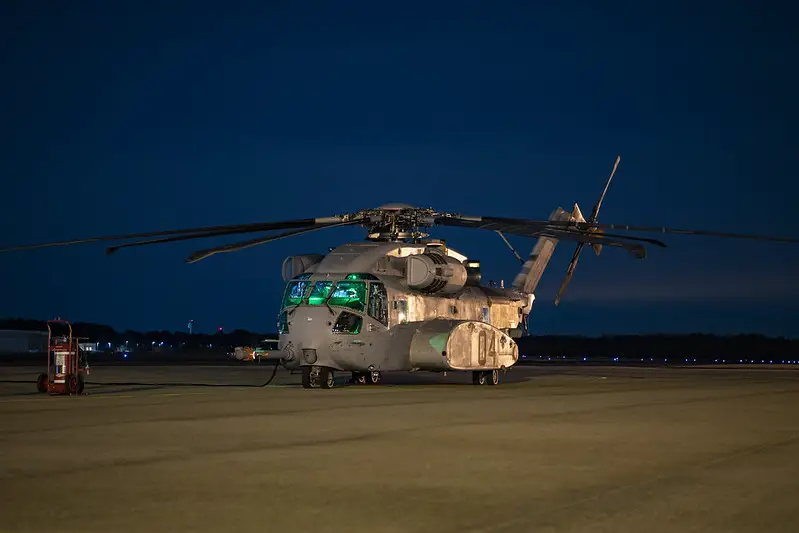The Sikorsky CH-53K King Stallion is a heavy-lift cargo helicopter currently being developed by Sikorsky Aircraft for the United States Marine Corps (USMC). The design features three 7,500 shp (5,590 kW) engines, new composite rotor blades, and a wider aircraft cabin than previous CH-53 variants. It will be the largest and heaviest helicopter in the U.S. military. The USMC plans to receive 200 helicopters at a total cost of $25 billion. Ground Test Vehicle (GTV) testing started in April 2014; flight testing began with the maiden flight on 27 October 2015. In May 2018 the first CH-53K was delivered to the Marine Corps.

The CH-53K is a general redesign with new engines and cockpit layout. The CH-53K will use General Electric T408 (GE38-1B) engines rated at 7,500 shp (5,600 kW) each and will be able to fly 20 knots (37 km/h; 23 mph) faster than its CH-53E predecessor. It will feature a new digital glass cockpit with fly-by-wire controls and haptic feedback, HUMS, a new elastomeric hub system, and composite rotor blades to improve “hot and high” performance. The split torque gearbox with quill shafts started development around 2007. The gearbox assembly including rotor hub and rotating control system weighs around 11,650 lb (5,280 kg), which is heavier than an empty Black Hawk helicopter. The split torque gearbox weighs 5,270 lb (2,390 kg). By comparison, the twin-engine Mil Mi-26 split torque gearbox weighs 8,020 lb (3,639 kg).

The CH-53K will also include an improved external cargo handling system, survivability enhancements, and improvements to extend service life. The cabin will be 30 ft (9.14 m) long by 9 ft (2.74 m) wide by 6.5 ft (1.98 m) tall.[56] Its cabin will be 1 ft (30 cm) wider and 15% larger, but will have new shorter composite sponsons. The CH-53K is to surpass the capability of the CH-53E by carrying nearly double the external payload of 27,000 lb (12,200 kg) over the same radius of 110 nmi (204 km). The CH-53K’s payload reaches a maximum of 35,000 lb (15,900 kg). The CH-53K’s maximum gross weight will be 88,000 lb (39,900 kg), which is increased over the CH-53E’s 73,500 lb (33,300 kg). The CH-53K will keep approximately the same footprint as the CH-53E.

The CH-53K can carry two 463L master pallets, eliminating the need to break apart pallets between airlifter and helicopter. The CH-53K is a general redesign of the CH-53E. The main improvements are new engines and cockpit layout. The CH-53K will have over twice the lift capacity and radius of action of the CH-53E, and a wider cargo hold to allow it to carry a Humvee internally. Major subcontractors include Aurora Flight Sciences (main rotor pylon), Exelis Aerostructures (tail rotor pylon and sponsons), GKN Aerospace (aft transition),Onboard Systems International (external cargo hook system), Rockwell Collins (avionics management system), Sanmina-SCI Corporation (Intercommunications System), and Spirit AeroSystems (cockpit and cabin).
















